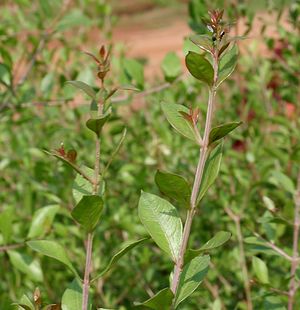Note: This is a project under development. The articles on this wiki are just being initiated and broadly incomplete. You can Help creating new pages.
Lawsonia inermis - Mendhika
Henna[1] (Lawsonia inermis, also known as hina, the henna tree, the mignonette tree, and the Egyptian privet) is a flowering plant and the sole species of the Lawsonia genus. The English name "henna" comes from the Arabic حِنَّاء (ALA-LC: ḥinnāʾ; pronounced [ħɪnˈnæːʔ]) or, colloquially حنا, loosely pronounced as /ħinna/.
Uses
bleeding, nerve deseases, amoebic dysentery, wounds, Skin eruptions, ulcers, Pimples, Diarrhea, Sore throats
Parts Used
Chemical Composition
The major components were ethyl hexadecanoate (24.4%), (E)-methyl cinnamate (11.4%), isocaryophyllene (8.1%), (E)-β-ionone (5.8%) and methyl linolenate (4.1%).[2]
Common names
| Language | Common name |
|---|---|
| Kannada | goranta, gorante |
| Hindi | hena, henna |
| Malayalam | mail-anschi, mailanci |
| Tamil | aivanam, aivanam |
| Telugu | goranta, gorata |
| Marathi | NA |
| Gujarathi | NA |
| Punjabi | NA |
| Kashmiri | NA |
| Sanskrit | dvivranta, kokadanta |
| English | henna |
Properties
Reference: Dravya - Substance, Rasa - Taste, Guna - Qualities, Veerya - Potency, Vipaka - Post-digesion effect, Karma - Pharmacological activity, Prabhava - Therepeutics.
Dravya
Rasa
Guna
Veerya
Vipaka
Karma
Prabhava
Habit
Identification
Leaf
| Kind | Shape | Feature |
|---|---|---|
| Simple | Henna is a thorny evergreen shrub that can reach up to 6.0 m in heightThe leaves are divided into 3-6 toothed leaflets, with smaller leaflets in between |
Flower
| Type | Size | Color and composition | Stamen | More information |
|---|---|---|---|---|
| Unisexual | 2-4cm long | Yellow | 5-20 | The fragrant flowers are whitish or pink to brick red and sit in a pyramid-shaped inflorescence |
Fruit
| Type | Size | Mass | Appearance | Seeds | More information |
|---|---|---|---|---|---|
| simple | 7–10 mm | The fruit is a blue-black berry | single | {{{6}}} |
Other features
List of Ayurvedic medicine in which the herb is used
- Vishatinduka Taila as root juice extract
Where to get the saplings
Mode of Propagation
How to plant/cultivate
A plant of the dry to moist tropics and subtropics, where it is found at elevations up to 2,000 metres[4]
Commonly seen growing in areas
Photo Gallery
References
- ↑ Cite error: Invalid
<ref>tag; no text was provided for refs namedHenna - ↑ "chemical constituents"
- ↑ "plant description"
- ↑ "Cultivation Details"
External Links
- Pages with reference errors
- Ayurvedic Herbs known to be helpful to treat bleeding
- Ayurvedic Herbs known to be helpful to treat nerve deseases
- Ayurvedic Herbs known to be helpful to treat amoebic dysentery
- Ayurvedic Herbs known to be helpful to treat wounds
- Ayurvedic Herbs known to be helpful to treat Skin eruptions
- Ayurvedic Herbs known to be helpful to treat ulcers
- Ayurvedic Herbs known to be helpful to treat Pimples
- Ayurvedic Herbs known to be helpful to treat Diarrhea
- Ayurvedic Herbs known to be helpful to treat Sore throats
- Herbs with Leaves used in medicine
- Herbs with Seeds used in medicine
- Herbs with common name in Kannada
- Herbs with common name in Hindi
- Herbs with common name in Malayalam
- Herbs with common name in Tamil
- Herbs with common name in Telugu
- Herbs with common name in Sanskrit
- Herbs with common name in English
- Habit - Evergreen Shrub
- Index of Plants which can be propagated by Seeds
- Index of Plants which can be propagated by Cuttings
- Herbs that are commonly seen in the region of warmer parts of South and North America
- Herbs that are commonly seen in the region of meadows
- Herbs that are commonly seen in the region of Borders of forests and fields
- Herbs



